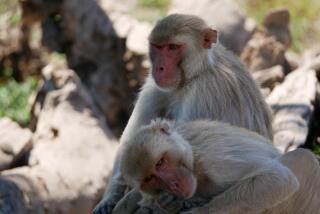Drug injection protects monkeys from vaginal HIV infection
A monthly injection of an experimental anti-retroviral drug protected female monkeys from vaginal infection by a simian form HIV, according to two new studies.
The research, which was published Wednesday in Science Translational Medicine, raises hopes for the development of a long-acting preexposure prophylaxis, or PrEP, drug that would guard against HIV infection during both anal and vaginal intercourse, according to scientists.
The experimental drug, GSK744 LA, was previously shown to be effective in protecting rhesus macaque monkeys against rectal infection by simian-human immunodeficiency virus, or SHIV.
On Wednesday, researchers said injections of the same drug protected 12 of 14 female macaques from vaginal SHIV infection, whereas 10 control monkeys who did not receive the drug were quickly infected.
“Our results ... highlight the promise of GSK744 LA as a next-generation PrEP candidate,” wrote HIV researcher Jessica Radzio, of the U.S. Centers for Disease Control and Prevention, and her colleagues.
“If proven safe and effective in human clinical trials, GSK744 LA may usher in a new way for PrEP delivery that parallels that of long-acting contraceptives.”
HIV, the virus that causes AIDS, continues to spread globally. At least 2.3 mllion new infections were recorded in 2012, while roughly half of all new cases occur in heterosexual women.
Although daily pre-exposure prophylaxis drugs like Truvada have been proven effective in preventing HIV infection, that effectiveness has been greatly limited by people’s inability to keep up with a daily pill regimen.
For women in low- and middle-income nations, where females suffer the majority of HIV infections, impediments to the proper use of the drugs include HIV stigma, poor information, and lack of community support, researchers say.
Health officials hope they can solve this problem by creating a drug that can be taken far less frequently, and can be administered as a monthly shot, or via an intravaginal ring.
Researchers say they the recent study results are particuarly promising, because the same types of monkeys were used to demonstarte the effectiveness of existing PrEP medications. At the same time, initial human safety trials suggest the experimental drug can be given to human with few negative effects.
GSK744 LA, which is classified as an investigational new drug, is being developed by the pharmaceutical firm, GlaxoSmithKline. The compound is an integrase inhibitor, and hampers the ability of a virus to alter a host cell’s genome. If the virus cannot alter the host cell’s DNA, it cannot replicate itself and spread to other cells.
In one of the studies, lead author Chasity Andrews, an HIV researcher with the Aaron Diamond AIDS Research Center at Rockefeller University in New York, and her colleagues, took 12 macaques and gave the drug to eight of them. The four remaining macaques were placed in a control group.
Of the eight GSK744 LA-treated monkeys, six showed no sign of infection after being challenged with SHIV several times (the virus was introduced via surgical tubing). However, evidence of the virus’ RNA was found in the blood of two of the drug-treated monkeys.
In the other study, Radzio and her colleagues took 12 monkeys as well, but treated half of them with the drug and used the other half as a control group. All six drug-treated monkeys were protected from infection.
In both studies, all of the non-treated monkeys developed infection soon after they were exposed to the virus.
Researchers wrote that further studies were needed to determine other variables surrounding infections.
In particular, Andrews and her colleagues wrote that the existence of other sexually transmitted diseases could impact the drug’s effect.
Follow @montemorin for science news







